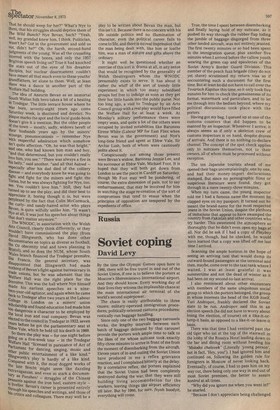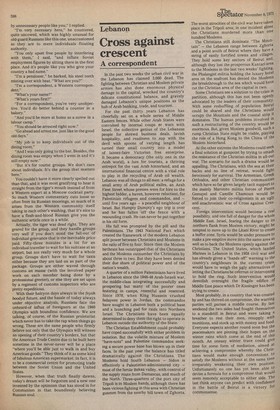Russia
Soviet coping
David Levy
By the time the Olympic Games open here in 1980, there will be free travel in and out of the Soviet Union, if one is to believe the porters at Moscow's Sheremietievo International airport, And they should know. Every working day of their lives they witness the implausible chaos at the main international air terminal of the world's second superpower. The chaos is easily attributable to three causes: military-operated immigration procedures; politically-oriented customs procedures: rustically-run baggage handling.
Since only one of the two baggage carousels works, the lengthy intervals between each batch of baggage delivered by that carousel provide the porters with ample time to talk to the likes of me whose suitcase took. exactly fifty-three minutes to arrive in front of me from the moment of disembarking from the aircraft. Eleven years of in-and-outing the Soviet Union have produced in me a reflex grievance reaction, and I complained bitterly at the delay. By a correlative reflex, the porters explained that the Soviet Union had been completely destroyed during the war, that they were still building living accommodation for the workers, leaving things like airport efficiency till later. But by 1980, for sure, fsyoh boodyit, everything will come.
True, the time I spent between disembarking and finally laying hold of my suitcase, as it pushed its way through the rubber flap hiding the jumble of baggage disgorged from three other landed aircraft, was not entirely wasted. The first twenty minutes or so had been spent in the immigration queue, plus another five minutes when I arrived before the callow youth wearing the green cap and epaulettes of the
Soviet Army's Border Guard Division. This member of the peach fuzz brigade (they do not yet shave) scrutinised my return visa as if encountering such a document for the first time. But at least he did not have to call over the Tovarisch Kapitan this time, so it only took five minutes for him to check the genuineness of its format, watermark and particulars, and to let me through into the bedlam beyond, where my political discussions took place with the porters.
Having got my bag, I queued up at one of the customs counters that did happen to be manned by an inspector. Whenever I arrive, it always seems as if only a skeleton crew of customs inspectors is on hand, despite droves of arrivals. And there is no nothing-to-declare channel. The concept of the spot check applies only to suitcases themselves, not to their owners, all of whom must be processed without exception.
The ten Japanese tourists ahead of me opened their bags uncomplainingly, one by one, and had their money-import declarations stamped. But since no pornographic films or suspicious literature were found, they got through in a mere twenty-three minutes.
When my turn came, the young inspector told me I had a famous name the moment he clapped eyes on my passport. It turned out he meant the brand-name for the most respected jeans in the Soviet Union, despite the plethora of imitations that appear to have swamped the country from Pakistan and other countries who try harder. This sweetened the atmosphere so thoroughly that he didn't even open my bags at all. Nor did he ask if I had a copy of Playboy with me, though, had he checked, he would have learned that a copy was lifted off me last time I arrived.
Scanning the ample horizon in the hope of seeing an arriving taxi that would dump its outward-bound passengers at the terminal and then, maybe, come over to the taxi rank where I waited, I was at least grateful it was summertime and not the dead of winter. as it had been on my second-to-last arrival.
I also reminisced about other encounters with members of the same ubiquitous social group to which the porters belonged, the group in whose interests the head of the KGB itself, Yuri Andropov, frankly declared the Soviet state to be run. Andropov said this in an election speech (he did not have to worry about losing the election, of 'course) on a like-it-or. lump-it basis, as opposed to a like-it-or-leave-it basis.
There was that time I had ventured past the old tiger who sat at the top of the stairwell in the lobby of the Rossiya Hotel leading down to the bar and dining room without heeding his
"Molodoi chelovek" (Literally 'young person', but in fact, 'Hey, your). I had ignored him and continued on, following the golden rule for foreigners in Moscow of never looking back.
Eventually, of course, I had to pass him on my way out, there being only one way in and out of most Soviet premises, the better to assure kontrol at all times.
"Why did you ignore me when you went in?"
he snarled.
"Because I don't appreciate being challenged by unnecessary people like you," I replied.
"I'm very necessary here," he countered, quite uncowed, which was highly unusual for old-guard Russians like this one, unaccustomed as they are to mere individuals flouting authority.
"You only upset free people by interfering with them," I said, "and inflate Soviet employment figures by sitting there in the first place. And it's people like you who give your country a bad name."
"I'm a pensioner," he barked, his steel teeth misting over with heat. "What are you?"
"I'm a correspondent, a Western correspondent."
"What's your name?"
"What's yours first?"
"For a correspondent, you're very unobjective. You'd do better behind a counter in a bakery."
"And you'd be more at home as a screw in a labour camp."
"You should be arrested right now."
"Go ahead and arrest me, just like in the good old days."
"My job is to keep individuals out of the dining room."
"And I was only going to the bar. Besides, the dining room was empty when I went in and it's still empty now."
"But it's for tourist groups. We don't care about individuals. It's the group that matters here."
You couldn't have it more clearly spelled out than that, and it was most gratifying to hear it straight from the tiger's mouth instead of from a Western expert at a Moscow cocktail party. So much Western commentary cuts loose so often from its Russian moorings, so much of it arises from the Western community itself taking in each other's washing, that it's nice to have a flesh-and-blood Russian give you the authentic article once in a while.
Actually, the tiger was dead right. They are geared for the group, and they handle groups very well if you don't mind the fall-out of individual grievance that is the inevitable price paid. Fifty-three minutes is a lot for an individual traveller to wait for his suitcase at an airport, but not really very much for a whole group. Groups don't have to wait for taxis either because they are laid on as part of the package. Groups are either waved through customs en masse (with the involved paper work on each member being done by a professional greeter), or else they are set upon by a regiment of customs inspectors who are pretty expeditious. With their halcyon days always in the fsyoh boodyit future, and the hassle of today always under objective analysis, Russians face the unheard-of influx of foreigners at the 1980 Olympics with boundless confidence. We are talking, of course, of the Russian proletariat which never has to take the rap when things go wrong. These are the same people who firmly believe not only that the Olympics Will witness an opening of their country's borders, but that the American Trade Centre due to be built here sometime in the never-never will be a place "where you'll be able just to walk in and buy American goods." They think of it as some kind of fabulous American supermarket. In fact, it is to be a commercial centre for promoting trade between the Soviet Union and the United States.
However, when that truth finally dawns, today's dream will be forgotten and a new one invented by the optimism that has stood in for Communism in that boundlessly believing Russian soul.

































 Previous page
Previous page